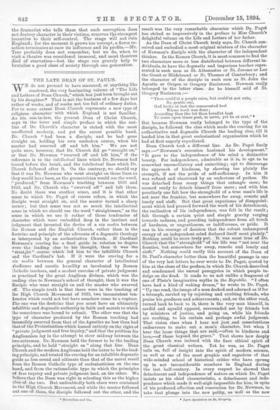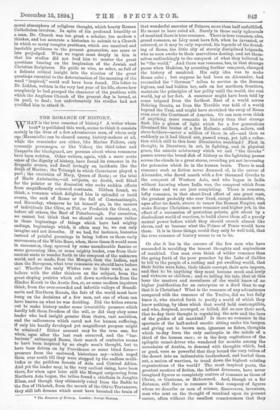THE LATE DEAN OF ST. PAUL'S.
WE do not pretend to have mastered, or anything like mastered, the very fascinating volume of "The Life and Letters of Dean Church," which has just been brought out by his daughter.* That is not the business of a few days but rather of weeks, and of weeks not too full of ordinary duties. For to some extent Dean Church represents a new type of religious character with which England is not familiar. As his son-in-law, the present Dean of Christ Church, says in the terse and simple preface in which the out- line of Dr. Church's character is etched with the most unaffected modesty, and yet the surest possible hand, Dr. Church "had been a disciple, and he had gone straight on, holding his own unshaken course, when his master had swerved off and left him." We are not quite sure, however, that Dr. Church did go "straight on," or that Dr. Newman "swerved off and left him," if the reference is to the intellectual lines which Dr. Newman had traced before the break, and the intellectual lines which Dr. Church followed after it. On the contrary, we should say that it was Dr. Newman who went straight on those lines as they would have been, as the geometrician would use the word, "produced," from Newman's teaching between 1838 and 1843, and Dr. Church who "swerved off" and left them. No doubt there was another sense, and it is that other sense to which Dr. Paget of course refers, in which the disciple went straight on, and the master turned a sharp :tomer ; but that sense was not so much the intellectual sense in which we should use the word "straightness," as the sense in which we use it rather of those tendencies of 3haracter which were embedded deep in the instinct and judgment that invented the device of a via media between the Roman and the English Church, rather than in the doctrine and principle of the advocate of a dogmatic theology ts interpreted by an authoritative Church. If Cardinal Newman's craving for a final guide in relation to dogma were the leading clue to his thought, then it was the " straight " course which led him to the infallible Church Ind the Cardinal's hat. If it were the craving for a oia media between the general character of intellectual sbedience and ascetic humility as inculcated by Roman Catholic teachers, and a modest exorcise of private judgment ss practised by the great Anglican divines, which was the leading clue to Newman's school of thought, then it was the disciple who went straight on and the master who swerved off. The simple truth is that there were in the teaching of the High Church Movement of 1833, two inconsistent ten- dencies which could not but have somehow come to a rupture. The one was the doctrine that you must have an ultimately infallible and dogmatic authority in faith and morals to which the conscience was bound to submit. The other was that the type of character produced by the Roman teaching had Insensibly swerved from that of the Apostles no less than had that of the Protestantism which leaned entirely on the right of "private judgment and free inquiry," and that the problem for Anglicanism lay in the attempt to steer midway between the Iwo extremes. Dr. Newman held the former to be the leading principle, and he held "straight on" along that line. Dean Church and the modern Anglicans held the latter to be the lead- ing principle, and treated the craving for an infallible dogmatic guide as less sound and ultimate than that of the moral recoil from the Roman Catholic type of ecclesiasticism on the one hand, and from the rationalistic type to which the principles of free inquiry and private judgment lead, on the other. We believe that the Dean was right in selecting this as the higher clue of the two. But undoubtedly both clues were contained in the High Church Movement, and while the master followed out one of them, the disciple followed out the other, and the
result was the very remarkable character which DT. Paget has etched so impressively in the preface to Miss Church's delightful volume on the Life and Letters of her father.
As the Dean of Christ Church truly says, Dr. Church op- ceived and embodied a most original mixture of the oharaoter of Newman's disciple with the character of the independent thinker. In the Raman Church, it is most common to find the
two characters inure or less distributed between different in- dividuals, to have the dogmatic and imperious teacher repre- sented in such men as St. Athana.sius or St. Jerome or Leo the Great or Hildebrand or St. Thomas of Canterbury; and the character of the disciple in such men as St. John the Apostle or Origen or Gregory Nazianzen. Newman really belonged to the latter class. As he himself said of St. Gregory Nazianzen :— "Thou could'st a people raise, but could'st not rule,
So, gentle one,
God broke at last the consecrated tool
Whose work was done ; According thee the lot thou loved'st best To muse upon times past, to serve, yet be at rest," *
But because Newman really belonged to the type of the disciple, he followed the clue which made the craving for an authoritative and dogmatic Church the leading clue, till it landed him in that great ecclesiastical organisation which he
had at first eagerly repudiated.
Dean Church took a different line. As Dr. Paget finely says :—" Newman's secession hastened his development." "It gave to the independence of his mind a distinctive beauty. For independence, admirable as it is, is apt to be somewhat unconciliatory and uninviting; apt to discourage the approach of kindness, by showing too plainly the strength, if not the pride of self-sufficiency. In him it was refined and chastened by an undertone of pathos. He was detached from many things that entangle men ; he seemed ready to detach himself from more ; and with him peculiarly one felt how the stronghold of a true man's life ip not near the frontier, but somewhere far away, remote and lonely and aloft. But that great experience of disappoint- ment which had pressed forward the work of his detachment, the realisation of his independence, was felt in the result ; felt through a certain quiet and simple gravity verging towards sadness, and guarding independence from all touch of hardness, or ungentleness, or indifference, or pride. It
was in his courage of decision that the robust unhampered energy of an independent mind declared itself most plainly." Nothing could be more truly put. It was most true of Dr. Church that the "stronghold" of his life was "not near the frontier, but somewhere far away, remote and lonely and
aloft." Nothing could verify this account of the Dean of St. Paul's character better than the beautiful passage in one of the very last letters he ever wrote to Dr. Paget, quoted by him at the close of the preface, in which Dr. Church described and condemned the unreal panegyrics in which people in- dulge on the dead. It reads to us not unlike a fragment of one of Plato's imaginative myths in the Republic. "I often have had a kind of waking dream," he wrote to Dr. Paget.
"Up one road, the image of a man decked and adorned as if for a triumph, carried up by rejoicing and exulting friends, who praise his goodness and achievements ; and, on the other road, turned back to back to it, there is the very man himself, in sordid and squalid apparel, surrounded not by friends but by ministers of justice, and going on, while his friends are exulting, to his certain and perhaps awful judgment. That vision rises when I hear not just and conscientious endeavours to make out a man's character, but when I bear the loose things that are said,—of ten in kindness and love,—of those beyond the grave." That shows how deeply Dean Church was imbued with the finer ethical spirit of the great classical writers. Yet he was, as Dr. Paget tells us, full of insight into the spirit of modern science, as well as one of the most graphic and sagacious of that wide-minded school of historical critics who have sprang up in not inconsiderable numbers in England during the last half-century. In every respect he showed that detachment and independence of nature on which Dr. Paget insists as his chief characteristic, a detachment and inde- pendence which made it well-nigh impossible for him, in spite of his profound affection and veneration for Dr. Newman, to take that plunge into the new polity, as well as the new
• Ilacmousul Rfla co. Lyra Apeatolica on St. Grogory. moral atmosphere of religious thought, which hearty Roman Catholicism involves. In spite of his profound hamility as a man, Dr. Church was too great a scholar, too modern a thinker, and too accurate a historian to submit to a Church in which so many complex problems, which are unsolved and insoluble problems to the present generation, are more or kiss prejudged. What we regret most deeply in him is that his studies did not lead him to master the great qaestions bearing on the inspiration of the Jewish and Christian Scriptures. No guide so wise, so sober, so full of a delicate critical insight into the niceties of the great questions essential to the determination of the meaning of the word "inspired," could well have been found. His letter to Dr. Liddon, written in the very last year of his life, shows how completely he had grasped the character of the problem with which the Anglican Church of the present day is bound, at its peril, to deal ; but unfortunately his studies had not qualified him to attack it.









































 Previous page
Previous page